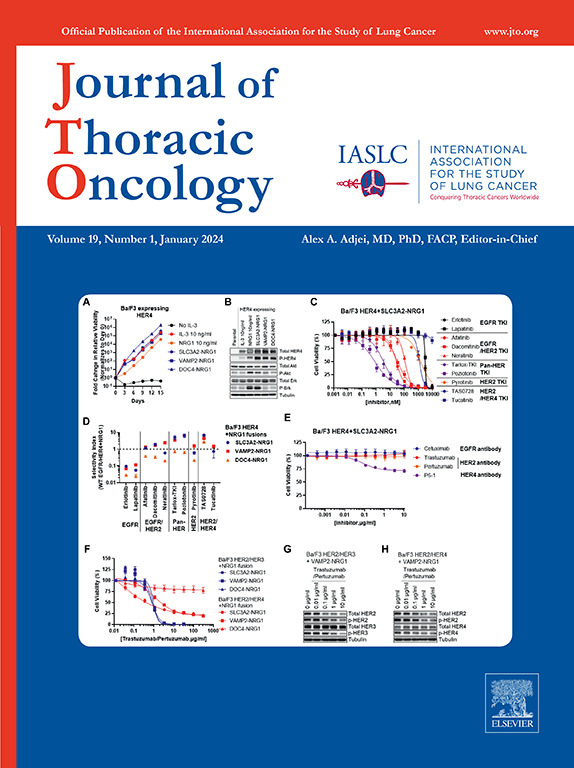Decoding the Clinical and Molecular Signatures of EGFR Common, Compound, and Uncommon Mutations in NSCLC: A Brief Report
IF 21
1区 医学
Q1 ONCOLOGY
引用次数: 0
Abstract
Introduction
EGFR mutations are key oncogenic drivers in lung adenocarcinoma (LUAD), predominantly affecting Asian, nonsmoking, and female populations. Although common mutations, such as exon 19 deletions and L858R, respond well to tyrosine kinase inhibitors (TKIs), uncommon EGFR mutations and compound variants exhibit variable treatment responses. This study aims to compare clinical characteristics and molecular profiles of patients with common, uncommon, and compound EGFR mutations, assessing their implications for therapy outcomes.
Methods
We analyzed a multi-cohort genomic dataset of 19,163 patients with LUAD (5,212 with EGFR mutations), categorizing mutations into common, uncommon, and compound classes. Patient demographics, mutational signatures, and tumor microenvironment factors were assessed, with particular attention to smoking status and concomitant alterations in KRAS and TP53. Treatment outcomes were analyzed by time under treatment as a surrogate measure of TKI efficacy.
Results
Uncommon EGFR mutations, comprising 8.9% of EGFR-altered cases, were significantly more frequent among smokers and associated with tobacco-related mutational signatures. Compared with common EGFR-mutant cases, tumors harboring uncommon EGFR mutations reported higher rates of EGFR amplifications, KRAS, and TP53 mutations. Uncommon mutations also exhibited higher tumor mutational burden and distinct transcriptional profiles linked to cell cycle activity. Median time on treatment with TKIs was notably shorter in patients with uncommon mutations (4.1 mo) than those with common and compound mutations (10.9 mo and 12.4 mo, respectively).
Conclusions
This study underscores the clinical and molecular heterogeneity of EGFR mutation classes in LUAD, highlighting the unique profile of uncommon mutations, particularly their association with smoking and co-mutations in KRAS and TP53. Comprehensive molecular testing, including next-generation sequencing, is crucial to identify these uncommon mutations and inform therapeutic decisions. Further investigation into the role of immunotherapy in patients with uncommon EGFR mutations is warranted given the tobacco-related molecular signatures and high tumor mutational burden associated with this subgroup.

解码非小细胞肺癌中EGFR常见、复合和不常见突变的临床和分子特征
简介:表皮生长因子受体(EGFR)突变是肺腺癌(LUAD)的关键致癌驱动因素,主要影响亚洲、非吸烟和女性人群。虽然常见的突变,如外显子19缺失和L858R,对酪氨酸激酶抑制剂(TKIs)反应良好,但不常见的EGFR突变和复合变体表现出不同的治疗反应。本研究旨在比较常见、不常见和复合EGFR突变患者的临床特征和分子谱,评估其对治疗结果的影响。方法:我们分析了19163例LUAD患者的多队列基因组数据集(5212例有EGFR突变),将突变分为常见、不常见和复合三类。评估患者人口统计学、突变特征和肿瘤微环境因素,特别关注吸烟状况和KRAS和TP53的伴随改变。通过治疗时间作为TKI疗效的替代测量来分析治疗结果。结果:不常见的EGFR突变,占EGFR改变病例的8.9%,在吸烟者中更为常见,并且与烟草相关的突变特征相关。与常见的EGFR突变病例相比,含有不常见EGFR突变的肿瘤显示出更高的EGFR扩增率、KRAS和TP53突变率。不常见的突变还表现出更高的肿瘤突变负担(TMB)和与细胞周期活性相关的独特转录谱。与常见和复合突变患者(分别为10.9和12.4个月)相比,不常见突变患者(4.1个月)TKIs治疗的中位时间明显缩短。结论:本研究强调了LUAD中EGFR突变类别的临床和分子异质性,突出了罕见突变的独特特征,特别是它们与吸烟和KRAS和TP53共突变的关联。全面的分子检测,包括下一代测序,对于识别这些不常见的突变和告知治疗决策至关重要。鉴于烟草相关的分子特征和与该亚群相关的高TMB,有必要进一步研究免疫治疗在罕见EGFR突变患者中的作用。
本文章由计算机程序翻译,如有差异,请以英文原文为准。
求助全文
约1分钟内获得全文
求助全文
来源期刊

Journal of Thoracic Oncology
医学-呼吸系统
CiteScore
36.00
自引率
3.90%
发文量
1406
审稿时长
13 days
期刊介绍:
Journal of Thoracic Oncology (JTO), the official journal of the International Association for the Study of Lung Cancer,is the primary educational and informational publication for topics relevant to the prevention, detection, diagnosis, and treatment of all thoracic malignancies.The readship includes epidemiologists, medical oncologists, radiation oncologists, thoracic surgeons, pulmonologists, radiologists, pathologists, nuclear medicine physicians, and research scientists with a special interest in thoracic oncology.
 求助内容:
求助内容: 应助结果提醒方式:
应助结果提醒方式:


